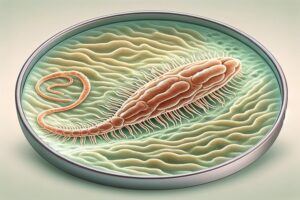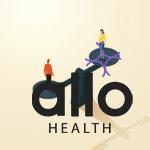Trichomoniasis and Erectile dysfunction
"The following blog article provides general information and insights on various topics. However, it is important to note that the information presented is not intended as professional advice in any specific field or area. The content of this blog is for general educational and informational purposes only.
Book consultation
The content should not be interpreted as endorsement, recommendation, or guarantee of any product, service, or information mentioned. Readers are solely responsible for the decisions and actions they take based on the information provided in this blog. It is essential to exercise individual judgment, critical thinking, and personal responsibility when applying or implementing any information or suggestions discussed in the blog."
When it comes to sexual health, there are a number of conditions that men may experience, ranging from mild nuisances to more serious concerns with lasting consequences. Two such conditions are trichomoniasis and erectile dysfunction – and while these may seem unrelated, there is actually a significant link between the two.
Trichomoniasis: An STI
Trichomoniasis Infection is a common sexually transmitted infection (STI) that is caused by the Trichomonas vaginalis parasite. This parasite is spread through vaginal intercourse, and it can also be transmitted through other forms of sexual contact. While many individuals with trichomoniasis experience no symptoms at all, some men may experience a variety of unpleasant effects mainly in the genital tract, including discomfort during urination, itching and burning around the genitals, and a green discharge from the penis as Trichomoniasis Symptoms.
In addition to the symptoms experienced by men, women with trichomoniasis may also experience discomfort during sex, itching and burning around the genitals, and a frothy, yellow-green vaginal discharge. It is important to note that trichomoniasis can also increase the risk of contracting other sexually transmitted infections, such as HIV. If left untreated, trichomoniasis can lead to more serious health problems, such as pelvic inflammatory disease (PID) in women, which can cause infertility. It is important to get tested and treated for trichomoniasis if you suspect you may have been exposed to the infection. Treatment typically involves antibiotic treatment, and it is important to abstain from sexual activity until the infection has been fully treated to prevent reinfection or transmission to others.
Erectile Dysfunction
Erectile dysfunction, often referred to as ED, is a condition that impacts a significant number of men. Essentially, it involves difficulty getting or maintaining an erection that is adequate for sexual activity. ED can be caused by a range of factors, including underlying medical conditions, lifestyle habits, and certain medications.
One of the most common medical conditions that can lead to ED is cardiovascular disease or deranged heart health. This is because the same factors that contribute to heart disease, such as high blood pressure and high cholesterol, can also damage the blood vessels that supply blood to the penis. Additionally, psychological factors such as stress, anxiety, and depression can also contribute to ED. It is important to note that ED is a treatable condition. Depending on the underlying cause, treatment options may include lifestyle changes, medication, or therapy. It is also important for men to speak openly with their healthcare provider about any concerns they may have regarding their sexual health, as ED can be a sign of other underlying health issues.
Signs and Symptoms of Trichomoniasis
As noted earlier, many individuals with trichomoniasis experience no symptoms at all. However, those who do may notice a range of effects, including an unpleasant penile discharge, pain or discomfort during urination, and soreness or itching around the genitals. In some cases, these symptoms may come and go, or they may persist for some time.
It is important to note that trichomoniasis can also affect women, causing similar symptoms such as vaginal discharge, itching, and discomfort during sex. In some cases, the discharge may have a strong odor and be frothy or yellow-green in color. If left untreated, trichomoniasis can lead to more serious health complications in infected persons, such as an increased risk of contracting other sexually transmitted infections (STIs) and even infertility. It is important to seek medical attention if you suspect you may have trichomoniasis or any other STI, as early diagnosis and treatment can prevent further health problems.
Signs and Symptoms of Erectile Dysfunction
The symptoms of erectile dysfunction can be very straightforward. Essentially, individuals with ED may find that they are unable to get or maintain an erection that is sufficient for penetrative sex. Other symptoms may include a reduced sex drive, anxiety or stress around sexual encounters, and difficulty achieving orgasm.
It is important to note that erectile dysfunction can also be a symptom of an underlying medical condition, such as diabetes, high blood pressure, or heart disease. In some cases, lifestyle factors such as smoking, excessive alcohol consumption, or obesity may also contribute to the development of ED. If you are experiencing symptoms of erectile dysfunction, it is important to speak with your healthcare provider to determine the underlying cause and explore treatment options.
How Does Trichomoniasis Affect Erectile Function?
So, what is the connection between trichomoniasis and erectile dysfunction? Essentially, trichomoniasis can cause inflammation and irritation in the genital area, which may impact blood flow and nerve function. Over time, this can make it more difficult for men to achieve erections, or to maintain them over time. Additionally, the discomfort and fear that may be associated with trichomoniasis can have a significant emotional impact, which may further impact sexual function.
It is important to note that trichomoniasis can also affect women’s sexual health. In women, trichomoniasis can cause vaginal itching, burning, and discharge, which can make sexual activity uncomfortable or painful. This can lead to a decrease in sexual desire and satisfaction. Furthermore, trichomoniasis can also increase the risk of contracting other sexually transmitted infections (STIs), such as HIV. This is because the inflammation and irritation caused by trichomoniasis can create small tears in the genital area, which can make it easier for other infections to enter the body. Therefore, it is important to get tested and treated for trichomoniasis as soon as possible to prevent further complications.
How Common is Trichomoniasis in Men?
Trichomoniasis is a relatively common STI, with around 3.7 million Americans affected each year. Men are among the population groups who are most commonly affected, particularly those who are sexually active and who have multiple partners.
It is important to note that trichomoniasis can often go undiagnosed in men, as they may not experience any symptoms. This can lead to the infection being unknowingly spread to sexual partners. It is recommended that sexually active individuals, especially those with multiple partners, get tested regularly for STIs, including trichomoniasis. Early detection and treatment can prevent the spread of the infection and potential long-term health complications.
How Common is Erectile Dysfunction in Men?
Estimates on the number of men affected by ED vary, but it is commonly thought that as many as 30 million men in the US alone may experience the condition at some point in their lives. Factors such as age and underlying medical conditions may contribute to higher rates of ED.
Additionally, lifestyle factors such as smoking, excessive alcohol consumption, and a sedentary lifestyle may also increase the risk of developing ED. It is important for men to prioritize their overall health and well-being in order to reduce their risk of experiencing this condition. Regular exercise, a healthy diet, and avoiding harmful habits can all contribute to maintaining good sexual health.
Risk Factors for Developing Trichomoniasis
There are a number of risk factors that can increase an individual’s likelihood of developing trichomoniasis. These may include having multiple sexual partners, engaging in unprotected sex, and having a history of other STIs. Additionally, older men may be at higher risk, in part due to age-related changes in immune function.
It is also important to note that trichomoniasis is more common in women than in men. This is because the infection is often asymptomatic in men, making it more difficult to diagnose and treat. Women who are pregnant or have weakened immune systems may also be at higher risk for developing trichomoniasis. It is important for individuals who are sexually active to get regular STI screenings and practice safe sex to reduce their risk of contracting trichomoniasis and other sexually transmitted infections.
Risk Factors for Developing Erectile Dysfunction
Similarly, there are a number of factors that can increase a man’s likelihood of developing ED. These may include underlying medical conditions such as cardiovascular disease, high blood pressure, and diabetes, as well as lifestyle factors such as smoking and poor diet.
Additionally, psychological factors such as stress, anxiety, and depression can also contribute to the development of ED. Relationship issues, such as communication problems or a lack of intimacy, can also play a role. It is important for men to address both physical and psychological factors in order to effectively manage and treat ED. Seeking professional help from a healthcare provider or therapist can be beneficial in addressing these issues.
Diagnosis of Trichomoniasis and Erectile Dysfunction
If you are experiencing symptoms of trichomoniasis or ED, it is crucial to seek medical attention. A doctor can perform a physical exam, take a medical history, and order diagnostic tests as needed to make an accurate diagnosis. For trichomoniasis, these tests may include a urine sample, blood test, or swab of the genital area. For ED, doctors may perform a range of tests, including blood tests, an ultrasound of the penis, and/or a psychological evaluation.
It is important to note that trichomoniasis can often be asymptomatic, meaning that individuals may not experience any symptoms at all. Therefore, it is recommended that sexually active individuals get tested regularly, even if they do not have any symptoms. Additionally, trichomoniasis can increase the risk of contracting other sexually transmitted infections, such as HIV, so it is important to get tested and treated promptly.In the case of ED, it is important to address any underlying medical conditions that may be contributing to the issue. This may include managing diabetes, high blood pressure, or heart disease. Lifestyle changes, such as quitting smoking, losing weight, and exercising regularly, may also help improve symptoms. In some cases, medications or other treatments may be recommended, such as oral medications, injections, or vacuum devices. It is important to work closely with a healthcare provider to determine the best course of treatment for individual needs.
Treatment Options for Trichomoniasis
If you are diagnosed with trichomoniasis, there are a range of treatment options available. Typically, doctors will prescribe an antibiotic medication to kill off the parasite. Depending on the severity of the infection, treatment may take several days or up to a week. It is also important to engage in safe sex practices, and to notify any sexual partners to ensure they receive treatment as well.
In addition to medication and safe sex practices, it is recommended to avoid alcohol during treatment for trichomoniasis. Alcohol can interfere with the effectiveness of the medication and prolong the healing process. It is also important to complete the full course of treatment, even if symptoms improve before the medication is finished. Failure to complete the treatment can result in the infection returning or becoming resistant to the medication.
Treatment Options for Erectile Dysfunction
If you are diagnosed with ED, there are a range of treatment options available depending on the underlying cause of the condition. For some men, changes in lifestyle habits such as exercising and eating a healthy diet may be sufficient to improve erections. Others may benefit from medications that increase blood flow to the penis, or from devices such as vacuum pumps. In some cases, psychological or behavioral therapy may also be useful.
It is important to note that not all treatment options work for everyone, and it may take some trial and error to find the best solution for each individual. Additionally, it is recommended to consult with a healthcare provider before starting any new treatment for ED. They can help determine the underlying cause of the condition and recommend the most appropriate treatment plan.
Preventing Trichomoniasis and Erectile Dysfunction
There are a number of steps you can take to help prevent both trichomoniasis and ED. These may include practicing safe sex practices, using condoms or other forms of protection during sexual activity, and getting regular check-ups with your healthcare provider. You may also benefit from avoiding risk factors such as smoking, drug use, and excessive alcohol consumption.
In addition to these preventative measures, maintaining a healthy lifestyle can also help reduce your risk of developing trichomoniasis and ED. This includes eating a balanced diet, exercising regularly, and managing stress levels.It’s important to note that trichomoniasis and ED can also be caused by underlying medical conditions such as diabetes or heart disease. If you have any concerns about your sexual health or experience symptoms such as pain during sex or difficulty achieving or maintaining an erection, it’s important to speak with your healthcare provider as soon as possible. Early detection and treatment can help prevent further complications and improve your overall quality of life.
The Emotional Impact of Trichomoniasis and Erectile Dysfunction
It is important to note that both trichomoniasis and ED can have a significant emotional impact, particularly if they persist or worsen over time. Men with these conditions may experience feelings of embarrassment, shame, or anxiety, which can further impact sexual function. It is crucial to seek emotional support from loved ones, friends, or professionals if you are struggling with these feelings.
In addition to seeking emotional support, it is also important to address the physical symptoms of trichomoniasis and ED. Treatment options are available for both conditions, and seeking medical attention can help alleviate symptoms and improve overall sexual health.Furthermore, it is important to practice safe sex to prevent the spread of sexually transmitted infections, including trichomoniasis. Using condoms and getting regular STI testing can help reduce the risk of contracting or spreading infections. Open and honest communication with sexual partners is also crucial in maintaining sexual health and preventing the emotional impact of these conditions.
The Importance of Open Communication with Your Partner
If you are experiencing trichomoniasis or ED, it is crucial to be open and honest with your sexual partner(s). This can help ensure that they are able to receive appropriate treatment as needed, and can also help prevent the spread of the condition to other individuals. Additionally, open communication can help ease the emotional burden that may be associated with these conditions.
It is important to note that open communication with your partner should not be limited to discussing sexually transmitted infections or erectile dysfunction. Maintaining open and honest communication in all aspects of your relationship can help build trust and strengthen your bond. This can include discussing your feelings, desires, and concerns with your partner, as well as being receptive to their needs and perspectives. By prioritizing open communication, you can create a healthier and more fulfilling relationship.
Seeking Professional Help: When to See a Doctor
If you are experiencing symptoms of trichomoniasis or ED, or if you have concerns about your sexual health in general, it is important to seek professional help. A doctor or other healthcare provider can provide invaluable advice and guidance, as well as offer diagnostic tests and a range of treatment options.
Living with Trichomoniasis or Erectile Dysfunction: Coping Strategies and Support Resources
If you are living with trichomoniasis or ED, it is important to have a strong network of support. This may include seeking out resources such as support groups, online forums, or counseling services. Additionally, it is important to engage in self-care practices such as exercise, healthy eating, and mindfulness meditation, which can help improve overall wellbeing and reduce symptoms.
The Future of Research on the Link Between Trichomoniasis and Erectile Dysfunction
Looking ahead, there is much still to be learned about the link between trichomoniasis and ED. Ongoing research in the field may help shed light on the underlying mechanisms linking these two conditions, as well as identify new treatment options and prevention strategies to reduce the impact of both on men’s sexual and emotional health.
Most Asked Questions
-
Can an L5-S1 damage without delay reason erectile dysfunction?
No, an L5-S1 harm mainly involves the decrease returned and lower extremities, and it would not immediately effect the nerves responsible for erectile feature. However, elements related to the injury, including psychological stress and medication side consequences, can contribute to erectile disorder.
-
Can acupressure effectively treat erectile dysfunction?
While acupressure may help alleviate some symptoms of ED by addressing underlying factors such as stress and poor circulation, it's essential to consult a healthcare professional for a comprehensive treatment plan tailored to your specific needs.
-
Can a mixture of lisinopril and losartan worsen erectile dysfunction?
Combining lisinopril and losartan isn't always a not unusual practice due to their comparable mechanisms of movement. But, if an individual is on a combination of antihypertensive medicinal drugs and reviews sexual facet consequences, consulting with a healthcare company is crucial. Adjustments to the drugs routine or exploring alternative options may be considered.
-
Can fatigue lead to erectile dysfunction?
Prolonged tiredness affects blood flow and hormonal balance, contributing to ED.
-
Can Caloric Restriction Affect Blood Vessel Health and Contribute to Erectile Dysfunction?
Yes, caloric limit may additionally make contributions to endothelial dysfunction, affecting the fitness of blood vessels. Endothelial cells play a important function in preserving vascular feature, and any impairment can affect blood glide to the penis. This vascular effect is a key aspect inside the improvement of erectile disorder associated with calorie deficits.
-
Can Cold Medicine Cause Erectile Dysfunction?
While cold medicines are commonly no longer a direct motive of erectile disorder, positive ingredients like decongestants can also, in rare instances, affect blood flow and make a contribution to concerns in accomplishing or keeping an erection. This isn't always a common side impact, and the effect varies among people.
-
Can ayurveda be used as a complete alternative to viagra for treating erectile dysfunction?
Ayurveda may help some individuals with mild sexual concerns, but it may not be a suitable replacement for viagra in severe cases of erectile dysfunction. Always consult with a healthcare professional to explore the best treatment options for your specific needs.
-
Can changing my lifestyle really help with erectile dysfunction?
Yes. Simple changes in your lifestyle can make a big difference. Regular exercise, a healthy diet, cutting down on alcohol consumption, and quitting smoking can improve blood flow and overall health, which are essential for a healthy sexual function. These changes not only help with ED but also boost your general well-being.
-
Can clove oil be used to treat erectile dysfunction?
While there is limited scientific evidence, some people believe that clove oil may help improve erectile function due to its ability to improve blood flow. However, it's essential to consult with a healthcare professional before using clove oil for this purpose.
-
Can cold testicles cause erectile dysfunction?
Cold testicles themselves are not the cause of erectile dysfunction (ED). Reduced blood flow due to cold can make it difficult to achieve or maintain an erection, but most of the time this doesn't matter. ED is a complex concern with many causes, including physical, mental and lifestyle factors.







































